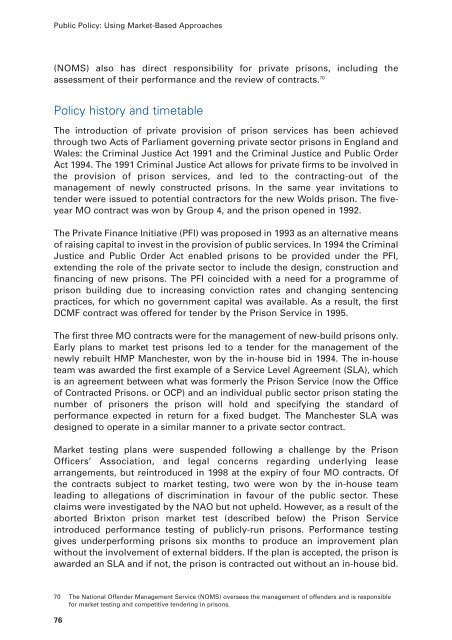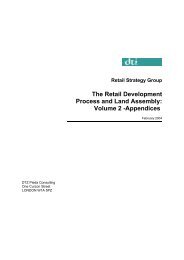Public Policy: Using Market-Based Approaches - Department for ...
Public Policy: Using Market-Based Approaches - Department for ...
Public Policy: Using Market-Based Approaches - Department for ...
You also want an ePaper? Increase the reach of your titles
YUMPU automatically turns print PDFs into web optimized ePapers that Google loves.
<strong>Public</strong> <strong>Policy</strong>: <strong>Using</strong> <strong>Market</strong>-<strong>Based</strong> <strong>Approaches</strong><br />
(NOMS) also has direct responsibility <strong>for</strong> private prisons, including the<br />
assessment of their per<strong>for</strong>mance and the review of contracts. 70<br />
<strong>Policy</strong> history and timetable<br />
The introduction of private provision of prison services has been achieved<br />
through two Acts of Parliament governing private sector prisons in England and<br />
Wales: the Criminal Justice Act 1991 and the Criminal Justice and <strong>Public</strong> Order<br />
Act 1994. The 1991 Criminal Justice Act allows <strong>for</strong> private firms to be involved in<br />
the provision of prison services, and led to the contracting-out of the<br />
management of newly constructed prisons. In the same year invitations to<br />
tender were issued to potential contractors <strong>for</strong> the new Wolds prison. The fiveyear<br />
MO contract was won by Group 4, and the prison opened in 1992.<br />
The Private Finance Initiative (PFI) was proposed in 1993 as an alternative means<br />
of raising capital to invest in the provision of public services. In 1994 the Criminal<br />
Justice and <strong>Public</strong> Order Act enabled prisons to be provided under the PFI,<br />
extending the role of the private sector to include the design, construction and<br />
financing of new prisons. The PFI coincided with a need <strong>for</strong> a programme of<br />
prison building due to increasing conviction rates and changing sentencing<br />
practices, <strong>for</strong> which no government capital was available. As a result, the first<br />
DCMF contract was offered <strong>for</strong> tender by the Prison Service in 1995.<br />
The first three MO contracts were <strong>for</strong> the management of new-build prisons only.<br />
Early plans to market test prisons led to a tender <strong>for</strong> the management of the<br />
newly rebuilt HMP Manchester, won by the in-house bid in 1994. The in-house<br />
team was awarded the first example of a Service Level Agreement (SLA), which<br />
is an agreement between what was <strong>for</strong>merly the Prison Service (now the Office<br />
of Contracted Prisons. or OCP) and an individual public sector prison stating the<br />
number of prisoners the prison will hold and specifying the standard of<br />
per<strong>for</strong>mance expected in return <strong>for</strong> a fixed budget. The Manchester SLA was<br />
designed to operate in a similar manner to a private sector contract.<br />
<strong>Market</strong> testing plans were suspended following a challenge by the Prison<br />
Officers’ Association, and legal concerns regarding underlying lease<br />
arrangements, but reintroduced in 1998 at the expiry of four MO contracts. Of<br />
the contracts subject to market testing, two were won by the in-house team<br />
leading to allegations of discrimination in favour of the public sector. These<br />
claims were investigated by the NAO but not upheld. However, as a result of the<br />
aborted Brixton prison market test (described below) the Prison Service<br />
introduced per<strong>for</strong>mance testing of publicly-run prisons. Per<strong>for</strong>mance testing<br />
gives underper<strong>for</strong>ming prisons six months to produce an improvement plan<br />
without the involvement of external bidders. If the plan is accepted, the prison is<br />
awarded an SLA and if not, the prison is contracted out without an in-house bid.<br />
70 The National Offender Management Service (NOMS) oversees the management of offenders and is responsible<br />
<strong>for</strong> market testing and competitive tendering in prisons.<br />
76
















